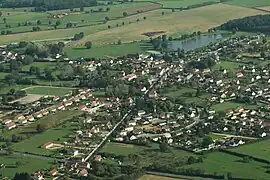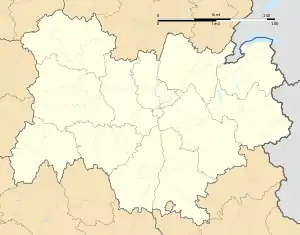Lusigny | |
|---|---|
 An aerial view of Lusigny | |
Location of Lusigny | |
 Lusigny  Lusigny | |
| Coordinates: 46°35′19″N 3°29′32″E / 46.5886°N 3.4922°E | |
| Country | France |
| Region | Auvergne-Rhône-Alpes |
| Department | Allier |
| Arrondissement | Moulins |
| Canton | Dompierre-sur-Besbre |
| Intercommunality | CA Moulins Communauté |
| Government | |
| • Mayor (2020–2026) | André Jardin[1] |
| Area 1 | 44.55 km2 (17.20 sq mi) |
| Population | 1,651 |
| • Density | 37/km2 (96/sq mi) |
| Time zone | UTC+01:00 (CET) |
| • Summer (DST) | UTC+02:00 (CEST) |
| INSEE/Postal code | 03156 /03230 |
| Elevation | 224–273 m (735–896 ft) (avg. 251 m or 823 ft) |
| 1 French Land Register data, which excludes lakes, ponds, glaciers > 1 km2 (0.386 sq mi or 247 acres) and river estuaries. | |
Lusigny (French pronunciation: [lyziɲi]) is a commune in the Allier department in central France.
Geography
Lusigny is a town located in the Auvergne-Rhône-Alpes region, in the department of Allier. Lusigny is located in the canton of Dompierre-sur-Besbre. It is located 12 kilometres (7.5 mi) from the town of Moulins. Its inhabitants are known as the Lusignois in French.
Population
| Year | Pop. | ±% |
|---|---|---|
| 1962 | 1,058 | — |
| 1968 | 1,066 | +0.8% |
| 1975 | 1,295 | +21.5% |
| 1982 | 1,541 | +19.0% |
| 1990 | 1,575 | +2.2% |
| 1999 | 1,428 | −9.3% |
| 2008 | 1,581 | +10.7% |
| 2012 | 1,712 | +8.3% |
- The population of Lusigny has been increasing over the long term, but at a decreasing rate.Between 1968 and 2020, the population increased by 57%,but between 2020 and 2030, it is projected to decrease by 5%.
- This suggests that the population of Lusigny is aging and that there is a net out-migration of young people.
- The projected population of Lusigny in 2030 is 1,596 people.
- This projection is based on the assumption that the recent trend in population decline will continue. However, it is important to note that this is just an estimate, and the actual population could be higher or lower.
See also
References
- ↑ "Répertoire national des élus: les maires" (in French). data.gouv.fr, Plateforme ouverte des données publiques françaises. 13 September 2022.
- ↑ "Populations légales 2021". The National Institute of Statistics and Economic Studies. 28 December 2023.
Wikimedia Commons has media related to Lusigny.
This article is issued from Wikipedia. The text is licensed under Creative Commons - Attribution - Sharealike. Additional terms may apply for the media files.